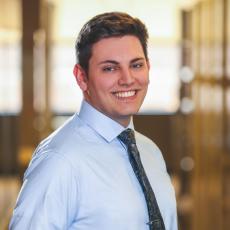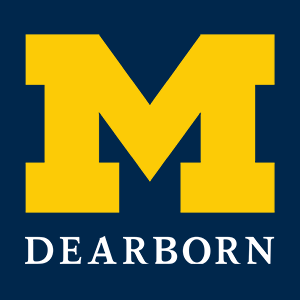What makes you a Difference Maker?
I believe I’m a Difference Maker because in everything that I do, whether it’s participating in research, student organizations or working on campus, I always strive to do my best. I also strive to make differences. I believe that it’s our responsibility in life to leave the world better than how we found it. To that end, I think that in every choice we make we should be constantly trying to make the best choice, and if there’s no best choice, to come up with a new one. That’s the philosophy I’ve adopted in my undergraduate career, and ultimately, I think that’s what makes me a Difference Maker. Change is not an active process—in order to make meaningful change, there has to be an active process to do so. And that active process has to be a team effort. In my undergraduate career, I’ve adopted the mantra, "we, not me," and it’s guided me to being a better leader and recognizing that change is all or nothing—the team makes it, or the team doesn't, it's not about the individual.
Highlight your campus achievements:
I came to this campus on the Chancellor's Full Tuition scholarship, and using that scholarship I’ve been able to be on the University Honors list my entire undergraduate career. I also received the Freshman Achievement Award in Chemistry my sophomore year, as well as the Leadership Synergy Award. I was fortunate enough to be able to represent UM-Dearborn at Camp Pride in North Carolina the summer of my freshman year, which is a leadership program designed to help students advocate for change at their universities for LGBTQ students. I’ve also participated in many student organizations in my time as a student at UM-Dearborn. Currently, I’m the president of PRIDE, which advocates for LGBTQ students and tries to make campus resources for them more available. I’m also the vice president of Neurology Club, where we try to teach students about the brain and other neurological theories in fun and interactive ways. I’m the treasurer of Chemistry Club, where we try to teach chemistry and incite interest in students around chemistry with interactive events, such as making your own ice cream and rock candy. Finally, I’m also in Global Brigades, and I’ll be traveling to Honduras this May to deliver medical care and public health infrastructure to those who go without it in the rural regions in Honduras. I’m also involved in two research labs on campus—one for cognitive psychology with Dr. Arlo Clark-Foos, where we study learning and memory effects like the intention cancellation and superiority effects as well as cryptomnesia, or unconscious plagiarism and the other for organic chemistry with Dr. Simona Marincean, where we’re researching a way to develop a bioassay with a Riboflavin-Biotin complex to make an easier method for determining riboflavin deficiency. I’m also a co-op in the Chemistry Dispensary where I help manage the laboratory assistants, process chemical waste, make solutions and set up teaching laboratories. I also work as a supplemental instruction leader in the Behavioral Sciences department, specifically in PSYC-381: Principles of Statistics and Experimental Design.
Highlight your leadership experiences both on and off campus:
I think my most specific example of leadership is my role as a co-op in the Chemistry Dispensary. In that role, co-ops are, in my supervisor's words, "the leaders of men." So, we are responsible for choreographing the flipping of labs across the science complex, which is a task that takes skill and understanding to accomplish. You have to be able to motivate people to push themselves, while setting an example for them that creates a trust in your leadership skills. So, I quickly learned a leader doesn't command, they guide. When something fails it’s not a failure of the person performing the task, but it’s the failure of the person instructing them and leading them. You also can't be close-minded, and one of the laboratory assistants taught me a different way to do something that was infinitely easier and more efficient. I also feel my experiences in that role had led me to see the leader as multi-faceted. You have to be a big picture person, but you also have to be attuned to detail, and enjoy the experience with the people you are leading, because it makes the experience worth it. Off campus, I represented the university at several conferences, including MBGLTACC (Midwest Bisexual, Gay, Lesbian, Transgender, Ally, College Conference), Camp Pride and the MPA (Midwestern Psychological Association) meeting in Chicago. I think that going to these conferences and representing my university has completely changed my outlook on what it means to be a leader. As a representative of the university, you must be poised and attuned to the fact that as a student leader, your behavior reflects on the university. It was also rewarding to be able to share and listen to ideas from other student leaders about how they engage and encourage students to participate in various things on their own campuses.
What is your dream career and/or long term life goal?
My dream career is to become a physician. I was very fortunate to shadow Dr. Sung Choi at the University of Michigan's Mott Children's Hospital, and it made it very clear to me that medicine was the career for me. It’s a combination of art and science that reminds me of my work in my laboratory courses, but it also integrates a unique aspect of the psycho-social status of the patients that sways the treatment plan for any particular patient. It also incorporates a career of lifelong learning, as well as lifelong teaching that I’ve been exposed to in my experiences as a SI leader, as well as incorporating research into the evaluation and determination for treatment plans. It’s also showed me that medicine—like change—is a team sport. There are constant interactions between different specialties, and even different hospitals, in order to give the patient the best possible care. So for me, medicine will help me fulfill what I consider to be my purpose—to make the world better than how I found it, and incorporating all of the ways that that’s possible.
What was your most defining moment at UM-Dearborn?
I think one of my most defining moments at UM-Dearborn was my entire fall semester of my sophomore year. It was my first time taking a leadership role in a student organization, and I also began working as a laboratory assistant at the chemistry dispensary, where I later became a co-op. It was also my start in research in cognitive psychology, which really opened my eyes to the impact that even undergraduate research can have on a global stage. It was also a time that tested me, and I believe that in that semester—when I began pushing myself to take a large course load and participate in other work, research and school opportunities—that I really began to undergo a transformation into the driven and passionate student I am now. It’s also the time when I began to see the interplay between these aspects of my life and how it had shaped me as a person who didn’t want to do one thing, but who wants to continue to teach, learn and research, as well as lead and be active in the community around me.


